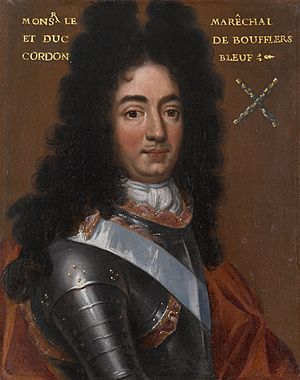Louis-François de Boufflers facts for kids
Quick facts for kids Louis-François de Boufflers |
|
|---|---|
| Duke of Boufflers | |

Portrait of the duke
|
|
| Governor of Flanders and Hainaut | |
| Tenure | 31 August 1694 – 1711 |
| Predecessor | Post created |
| Successor | Joseph Marie de Boufflers |
| Monarch | Louis XIV |
| Born | 10 January 1644 Crillon, Kingdom of France |
| Died | 22 August 1711 (aged 67) Fontainebleau, Kingdom of France |
| Spouse | Catherine Charlotte de Gramont |
| Issue | Joseph Marie, Duke of Boufflers |
| Signature | |
| Military service | |
| Battles/wars | |
Louis François de Boufflers (born January 10, 1644 – died August 22, 1711) was a very important French soldier. He became a high-ranking military leader called a Marshal of France. He also held noble titles like Count of Cagny and Duke of Boufflers.
Contents
A Famous French Soldier
Louis-François was born in Crillon, France, on January 10, 1644. He joined the army and first served in 1663 during the Siege of Marsal. By 1669, he became a colonel, leading a type of soldier called dragoons.
He fought in the conquest of Lorraine in 1670. Later, he served in the Dutch Republic under a famous general, Henri de la Tour d'Auvergne, Vicomte de Turenne. Louis-François often showed great skill and bravery. When Turenne was killed in 1675, Louis-François bravely led the French army's retreat. He quickly rose through the ranks, becoming a brigadier and then a maréchal de camp by 1677.
Rising Through the Ranks
Louis-François continued to serve with increasing success in many battles. In 1681, he became a lieutenant-general. He led the French army in the Moselle region, winning several early victories in the Nine Years' War (also known as the War of the Grand Alliance).
On October 15, 1688, he captured the important fortress of Mainz with 20,000 soldiers. He then moved his troops to the Sambre river. He helped another general, Duke of Luxembourg, just before the Battle of Fleurus (1690).
In 1691, he served directly under the king. During the attack on Mons, he was wounded. He was also with the king at the Siege of Namur (1692) in 1692. He played a part in the French victory at the Battle of Steenkerque. For his excellent service, he was promoted to Marshal of France in 1692. In 1694, he was given the title of duke. That same year, he married Catherine Charlotte de Gramont.
Defending France
In 1694, Louis-François became the governor of French Flanders and the city of Lille. In 1695, he was trapped inside Namur during a siege. He bravely defended the city, only surrendering after losing 8,000 of his 13,000 men. He played a key role in the talks that led to the Peace of Ryswick, which ended the Nine Years' War.
During the next major conflict, the War of the Spanish Succession, Louis-François tried to capture Nijmegen in 1702. He also tried to save Kaiserswerth, but these efforts were not successful. The next year, he led French and Spanish forces at the Battle of Ekeren.
In 1708, the city of Lille was under threat from powerful generals like John Churchill, 1st Duke of Marlborough and Prince Eugene of Savoy. Louis-François was put in charge of Lille's defense. He put up a very brave resistance for three months.
Even though Lille eventually fell, the king honored Louis-François as if he had won. His enemies respected his bravery and allowed him to set his own terms for surrender. In 1708, he became a peer of France. In 1709, when France was in great danger, Louis-François offered to serve under a younger general, Marshal-Duke of Villars. He fought with Villars at the Battle of Malplaquet. Here, he showed amazing skill. After Villars was wounded, Louis-François led the French army's retreat without losing any cannons or prisoners. He passed away in Fontainebleau on August 22, 1711.
Family Life
Louis-François married Catherine Charlotte de Gramont. Her father was Antoine Charles de Gramont, Duke of Gramont. They had one son named Joseph Marie de Boufflers, Duke of Boufflers, who was born on May 22, 1706, and died on July 2, 1747.
His Titles
Louis-François held several important titles during his life. He was often known as the Chevalier Boufflers. He was also known as the Duc de Boufflers ("Duke of Boufflers") and the Comte de Cagny ("Count of Cagny").
See also
 In Spanish: Louis François de Boufflers para niños
In Spanish: Louis François de Boufflers para niños

